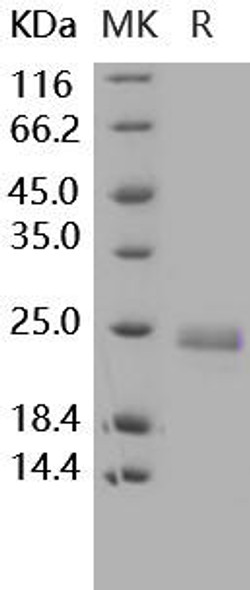Recombinant Mouse LIGHT/TNFSF14 Protein (Fc Tag) (RPES8459)
- SKU:
- RPES8459
- Size:
- 20μg
- Tag:
- C-Fc
- Reactivity:
- Mouse
- Expression Host:
- Mammalian
- Accession:
- Q9QYH9
Description
| Product Name: | Recombinant Mouse LIGHT/TNFSF14 Protein (Fc Tag) |
| SKU: | RPES8459 |
| Size: | 20μg |
| Tag: | C-Fc |
| Reactivity: | Mouse |
| Expression Host: | Mammalian |
| Accession: | Q9QYH9 |
| Sequence: | Asp72-Val239 |
| Calculated Molecular Weight: | 43.37 kDa |
| Observed Molecular Weight: | 50 kDa |
| Synonyms: | TNFSF, 1700013B14Rik, Light, Tnfsf14, TNFSF14, CD258, HVEML, LTg, TR2 |
| Endotoxin: | < 1.0 EU/mg of the protein as determined by the LAL method |
| Purity: | > 90% as determined by reducing SDS-PAGE. |
LIGHT , also known as TNFSF14 or CD258 , is a newly identified member of the TNF superfamily (TNFSF14) that is expressed by activated T lymphocytes , monocytes , granulocytes , spleen cells , and immature dendritic cells. TNFSF14 / LIGHT / CD258 is a type II transmembrane protein that is known to bind 2 membrane-bound TNFSF signaling receptors: HVEM , which is predominantly expressed by T cells , and lymphotoxin β receptor (LTβR) , which is expressed by stromal cells and nonlymphoid hematopoietic cells. TNFSF14 / LIGHT / CD258 also binds to a soluble non-signaling receptor , decoy receptor 3 (DcR3) , which can modulate the function of LIGHT in vivo. TNFSF14 / LIGHT / CD258 can also costimulate T cell responses via HVEM , which is constitutively expressed in most lymphocyte subpopulations , including CD4+ and CD8+ T cells. In addition , TNFSF14 / LIGHT / CD258 has been shown to suppress tumor formation in vivo and to induce tumor cell apoptosis via the up-regulation of intercellular adhesion molecule 1 and an increased lymphocyte adhesion to cancer cells. Thus , TNFSF14 / LIGHT / CD258 is being actively investigated as a possible basis for cancer treatment.
| Bio-activity: | Not validated for activity |
| Formulation: | Lyophilized from a 0.2 μm filtered solution in PBS with 5% Trehalose and 5% Mannitol. |
| Reconstitution: | It is recommended that sterile water be added to the vial to prepare a stock solution of 0.5 mg/mL. Concentration is measured by UV-Vis. |
| Storage: | Generally, lyophilized proteins are stable for up to 12 months when stored at -20 to -80℃. Reconstituted protein solution can be stored at 4-8℃ for 2-7 days. Aliquots of reconstituted samples are stable at < -20℃ for 3 months. |
| Shipping: | This product is provided as lyophilized powder which is shipped with ice packs. |






